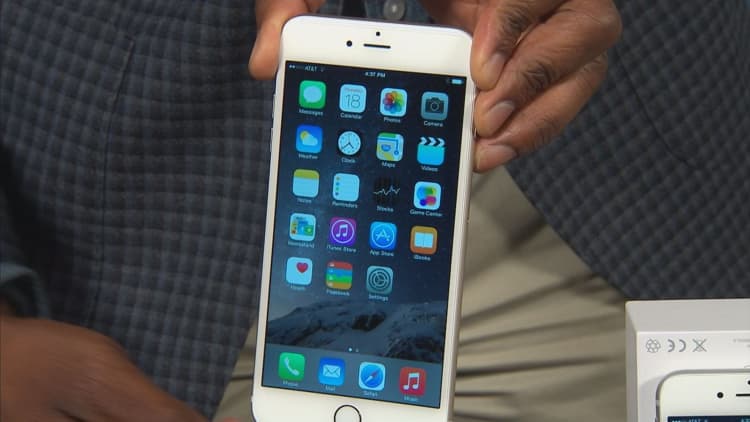If Apple fulfills expectations and debuts a new Apple Watch on Wednesday, it had better make a splash — because Apple is currently losing out to cheaper competition in the wearable market, according to new data.
Apple is expected to debut a upgraded Apple Watch at a highly anticipated event in San Francisco. Though the company hasn't said what it planned to say, Bloomberg's Mark Gurman said the new Apple Watch could include a GPS chip, a faster processor and battery life improvements.
It isn't expected to decouple from the iPhone just yet, a feature that would deliver cloud-based services, like streaming music and messaging.
But GPS might not be enough as the Apple appears to lag its simpler rivals in the wearable market. Shipments of Apple's wearables dropped nearly 57 percent in the second quarter, according to new estimates by International Data Corp.

While the addition of GPS is a critical upgrade for fitness-savvy consumers, Pacific Crest Securities analyst Andy Hargreaves said he expects Apple Watch units to decline 5 percent in the next fiscal year.
"Despite the potential for GPS to drive growth in Apple Watch unit volume, we continue to believe Apple will have to expand its wearables lineup with lower-functioning devices at lower price points to fully capture the opportunity," Hargreaves wrote in a research note.
The rising popularity of other lower-priced brands echoes earlier data that smartwatches have yet to catch on in the way simple fitness trackers have. The overall market for wearable devices grew 26.1 percent from the previous year in the second quarter, according to IDC's market intelligence, as companies like Fitbit and Garmin saw sales grow while Apple's shrank.
To be sure, it's hard to compare. Other companies have debuted more new models at different prices than Apple over the time period in the IDC survey.
The Apple Watch hasn't changed much since it went on sale in April 2015, although there have been some software updates and new band options. Fitbit has introduced new products like the Charge 2 and Flex 2.
Still, smart wearables seem to be struggling to find a place in the market, said Ramon Llamas, research manager at IDC. Basic wearables accounted for 82.8 percent of all wearable devices shipped during the quarter, and more vendors are entering the space, according to Llamas.
Shipments of more affordable "basic" wearables (devices that do not support third-party applications) grew 48.8 percent year over year, IDC said, while smart wearables (devices like Apple Watch that support third-party applications) declined 27.2 percent from the year-earlier period.
Apple doesn't reveal the sales of the Apple Watch individually, simply grouping earnings of "other products" like the Apple TV, Apple Watch, Beats products, iPod and Apple-branded and third-party accessories. Revenue from those products declined 16 percent year on year in the third fiscal quarter, the company said in its latest earnings report. Apple didn't respond to CNBC's request for comment.
On the plus side, the nonfitness features offered by wearables, like communications and mobile payments, are of growing popularity as consumers continue to enter the market, IDC said. This year, 25.5 percent of American adults will use a wearable device, a figure that's expected to jump 17.4 percent next year, according to eMarketer.
— CNBC's Harriet Taylor contributed to this report.


